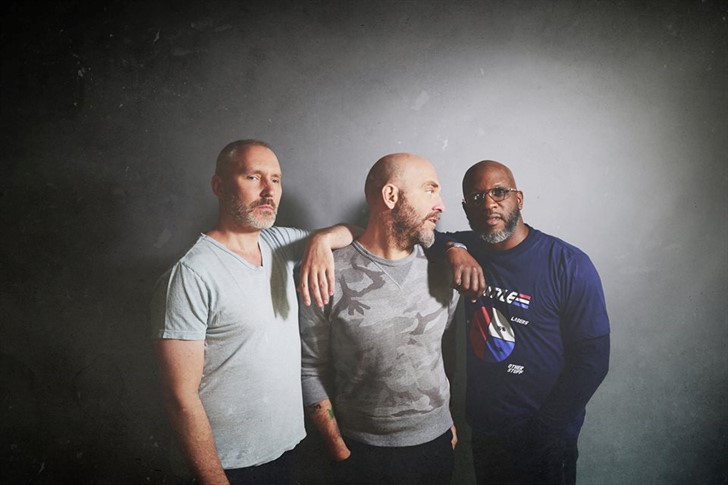Swing Time: The Bad Plus On Their New Lineup, New Album

“We’re truly the road band of all time,” declares Dave King, drummer for The Bad Plus. “Who else? Show me the jazz band that has played 160 shows a year for 15 years, and maybe 75 gigs its first three years, without a lineup change. It’s truly astonishing.”
That adds up to nearly 2,500 shows—a number that stopped rising on Dec. 31, 2017, when co-founding pianist Ethan Iverson departed the leaderless jazz-pop trio, which played together for the first time in bassist Reid Anderson’s Golden Valley, Minn. living room in the summer of 1990. “I felt what we had the first time we played together,” King says. “It was just, ‘Whoa!’” The first Bad Plus shows took place in December 2000, and they performed with Iverson for the final time during their annual New Year’s Eve run at the Manhattan jazz sanctuary, The Village Vanguard.
Iverson announced his departure from The Bad Plus in November 2016 to Anderson and King, who then went public in an April Facebook post, adding that the highly regarded Philadelphia keyboardist Orrin Evans would replace Iverson as of Jan. 1, 2018. The new trio played their first shows in St. Louis in mid-January, with an album due out on iTunes and thebadplus.com that month. (The LP edition came out in February.)
Friction between Iverson and his bandmates had been brewing for years, so his departure, according to King, “definitely wasn’t out of nowhere.” By way of explanation, Iverson told Minnesota’s Star Tribune: “I felt, personally, too uncomfortable, and also felt like the statement had been made.” Anderson, meanwhile, took a long pause when I asked him what happened. “I don’t think the issue is something I can describe to you in this interview,” he said before going off the record. What he would say is this: “It’s been a long time coming. Ethan wanted to leave the band, and he has our blessing to do so.”
All three members speak with pride about the beautifully eccentric music they made together, their mutual friendship holding fast for decades until it started to fray. King says that, for several years, he’d felt like either one of his bandmates “would quit any moment.” Anderson and King, who’ve known each other since junior high, had long felt that Iverson was drawing away from the group, with King coming to resent the “mopey energy” of the bandmate who he also describes as “one of the most brilliant musicians on the planet Earth.”
In the past, Iverson’s thoughtfully ornate style meshed immaculately with Anderson’s stentorian bass and King’s multidimensional drums. Since Bad Plus tunes run on the short side, at least for jazz, solos are spare and elegant enough to sound composed, and no single instrument juts out of their blend. “You wouldn’t believe how many times we’ve had to tell soundmen, ‘Stop putting the piano so loud in the mix,’ when they’ve got the piano jacked up twice as loud as the bass,” King says. “That’s not how we do it. We play a living dynamic that leaves room for instruments to take over other instruments in a sort of avant-garde fashion.”
Following Iverson’s announcement, Anderson and King considered pulling the plug on The Bad Plus, which they had conceived together and provided most of the material for. In the backs of their minds, however, was the possibility of working with Orrin Evans, whom Anderson had befriended and played with in Philadelphia prior to The Bad Plus. “Orrin was the only one we considered when we decided to keep it going,” King says. “If Orrin wanted to do it, we were going to do it. We weren’t going to hold tryouts.”
Evans signed on without having ever performed with King. “As an Aries, I know there’s something in me that has to lead,” Evans says. “And that’s cool. But a lot of people don’t realize that if I’m around people who I trust, who can also lead, it’s amazing what can happen.” Like his new bandmates, Evans balances the cerebral with the heartfelt and spiritual. He also brings a taste for funk, soul and gospel to the trio’s new equation.
Iverson—who cherishes performing with jazz elders such as Albert “Tootie” Heath, Billy Hart and Ron Carter—gave Evans his blessing as soon as news of his replacement broke, and the keyboardists have subsequently performed together as a duo. “There’s a piano fraternity,” Evans says. “There’s never any bad feelings or animosities; nothing but support.”
The Bad Plus made its initial impact on the jazz scene with cunningly deconstructed versions of pop hits like Nirvana’s “Smells Like Teen Spirit” and ABBA’s “Knowing Me, Knowing You,” which appeared on their eponymous 2001 debut. But while the covers thing is what they’re known for, “it isn’t really what we do,” Anderson says. Indeed, King and Anderson are thinking about downplaying that aspect of the combo even more in the future, which is why the title and content of their new album, Never Stop II, echoes 2010’s Never Stop, the first Bad Plus album to contain only original music.
After rehearsing their new material—Evans contributed two songs—in a schematic fashion, The Bad Plus 2.0 entered Brooklyn Recording to track it. They realized that, aside from a few rehearsals to get the core structures and arrangements in order, they’d never actually improvised together. “That was totally weird!” Evans says. The Plus traditionally tracks quickly and decisively, and King soon started to notice that—although they’d never played through any song entirely—“we were knocking them out,” with several first tracks making the final album.
“Our intuition was right,” he says proudly.
“But now, we’ve got to break the silence and do it live,” adds Evans.
This article originally appears in the March 2018 issue of Relix. For more features, interviews, album reviews and more, subscribe here.



















